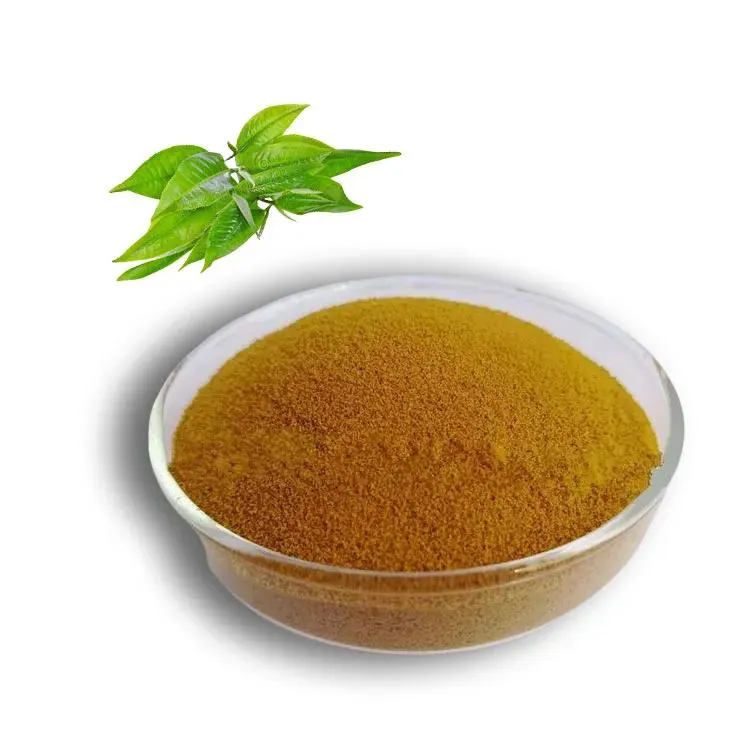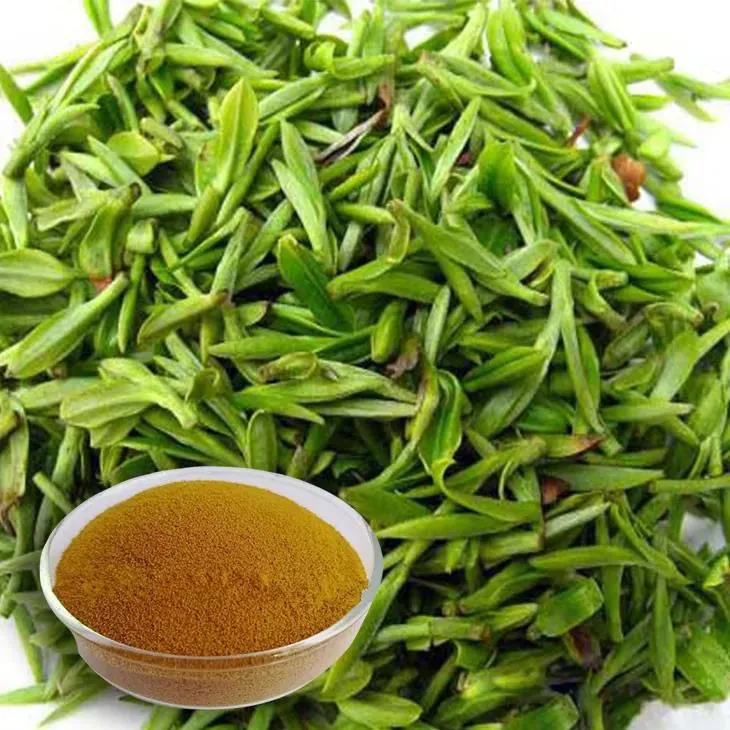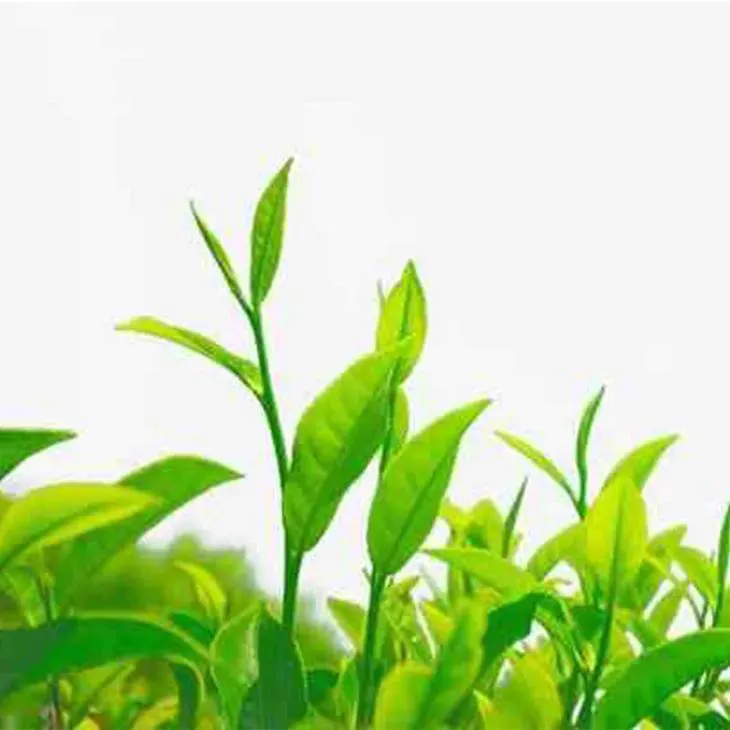- 0086-571-85302990
- sales@greenskybio.com
Green tea extract can reduce high blood pressure.
2024-11-13

Introduction
Hypertension, or high blood pressure, is a major global health concern. It is a significant risk factor for various cardiovascular diseases, such as heart attacks, strokes, and heart failure. With the increasing prevalence of hypertension and the potential side effects associated with traditional antihypertensive medications, there has been growing interest in exploring natural alternatives for blood pressure management. Green Tea Extract has emerged as a promising candidate in this regard, with numerous studies suggesting its potential in reducing high blood pressure.

What is Green Tea Extract?
Green Tea Extract is derived from the leaves of the Camellia sinensis plant. It contains a variety of bioactive compounds, including catechins, which are polyphenolic antioxidants. The most abundant catechin in green tea is epigallocatechin - 3 - gallate (EGCG). These compounds are believed to be responsible for many of the health benefits associated with green tea, including its potential antihypertensive effects.

Mechanisms of Action on Blood Pressure
1. Vasodilation
One of the primary mechanisms by which green tea extract may reduce blood pressure is through vasodilation. Catechins in green tea extract can stimulate the production of nitric oxide (NO) in the endothelial cells lining the blood vessels. Nitric oxide is a potent vasodilator, which means it relaxes the smooth muscle in the blood vessel walls, causing them to widen. This widening of the blood vessels leads to a decrease in peripheral resistance, which in turn reduces blood pressure. For example, in a study on rats, those treated with green tea extract showed increased NO production and subsequent vasodilation in their blood vessels.
2. Antioxidant Effects
Green tea extract's antioxidant properties also play a role in blood pressure regulation. Oxidative stress is associated with hypertension, as it can damage the endothelial cells and lead to impaired vasodilation. The catechins in green tea extract act as antioxidants, scavenging free radicals and reducing oxidative stress. By protecting the endothelial cells from oxidative damage, they help maintain normal endothelial function, which is crucial for proper blood vessel dilation and blood pressure control. In vitro studies have demonstrated that green tea extract can effectively neutralize free radicals and protect endothelial cells from oxidative injury.
3. Renin - Angiotensin - Aldosterone System (RAAS) Inhibition
The RAAS is an important hormonal system involved in blood pressure regulation. Renin is an enzyme that catalyzes the conversion of angiotensinogen to angiotensin I, which is then converted to angiotensin II by the angiotensin - converting enzyme (ACE). Angiotensin II is a potent vasoconstrictor and also stimulates the release of aldosterone, which promotes sodium and water retention, leading to increased blood volume and blood pressure. Green tea extract has been shown to inhibit the activity of ACE in some studies. By reducing the production of angiotensin II, it helps relax blood vessels and decrease blood pressure. Additionally, some evidence suggests that green tea extract may also have an impact on the regulation of aldosterone levels, further contributing to its antihypertensive effects.

Evidence from Scientific Studies
1. Animal Studies
Animal studies have provided valuable insights into the antihypertensive effects of green tea extract. In addition to the rat study mentioned earlier regarding vasodilation, other animal experiments have also shown positive results. For instance, in a study on hypertensive mice, those fed with a diet containing green tea extract had significantly lower blood pressure compared to the control group. These animal studies have allowed researchers to investigate the mechanisms of action in a more controlled environment and have provided a basis for further research in humans.
2. Human Clinical Trials
There have been numerous human clinical trials evaluating the effect of green tea extract on blood pressure. Some trials have reported significant reductions in systolic and diastolic blood pressure in hypertensive patients who consumed green tea extract. However, the results have not been entirely consistent across all studies.
- One possible reason for the variability in results could be differences in the dosage and duration of treatment. In some trials, relatively low doses of green tea extract were used, which may not have been sufficient to produce a significant blood pressure - lowering effect.
- Another factor could be the heterogeneity of the study populations. Different populations may respond differently to green tea extract depending on factors such as age, gender, diet, and baseline blood pressure levels.
Comparison with Traditional Antihypertensive Medications
Traditional antihypertensive medications, such as diuretics, beta - blockers, and ACE inhibitors, are highly effective in treating hypertension. However, they may also be associated with various side effects. For example, diuretics can cause electrolyte imbalances, beta - blockers may lead to fatigue and bradycardia, and ACE inhibitors can cause a dry cough in some patients.
- Green tea extract, on the other hand, is generally considered safe when consumed in moderation. It may offer a more natural alternative for individuals who are reluctant to take pharmaceutical medications or those who experience significant side effects from traditional antihypertensive drugs.
- However, it is important to note that green tea extract should not be considered a substitute for medical treatment in cases of severe hypertension. In such cases, traditional medications are often necessary to control blood pressure effectively.
Dosage and Safety Considerations
1. Dosage
The appropriate dosage of green tea extract for blood pressure management is still an area of ongoing research. In general, most studies have used dosages ranging from 300 - 1200 mg per day of green tea extract. However, it is crucial to follow the recommended dosage guidelines provided by healthcare professionals or product manufacturers. Higher doses may not necessarily lead to greater blood pressure - lowering effects and may increase the risk of adverse effects.
2. Safety
While green tea extract is generally safe for most people, there are some safety considerations.
- It may interact with certain medications, such as anticoagulants and some drugs metabolized by the liver. For example, green tea extract contains compounds that can inhibit cytochrome P450 enzymes, which are involved in the metabolism of many drugs. This interaction could potentially lead to increased levels of the drugs in the body, increasing the risk of side effects.
- Excessive consumption of green tea extract may also cause side effects such as nausea, vomiting, and insomnia. Additionally, high - dose or long - term use may be associated with liver toxicity in some rare cases.
Conclusion
Green tea extract shows potential as a natural alternative for the management of high blood pressure. Its multiple mechanisms of action, including vasodilation, antioxidant effects, and RAAS inhibition, suggest that it may play a role in reducing blood pressure. While evidence from scientific studies, both in animals and humans, is promising, more research is needed to fully understand its efficacy and safety. In particular, further large - scale, well - controlled clinical trials are required to determine the optimal dosage and to clarify its role in different populations. For individuals with hypertension, it may be worth considering incorporating green tea extract as part of a comprehensive approach to blood pressure management, but always under the guidance of a healthcare professional.
FAQ:
What are the main components in green tea extract that may reduce high blood pressure?
Green tea extract contains several bioactive components that may contribute to reducing high blood pressure. Catechins, especially epigallocatechin - 3 - gallate (EGCG), are the most studied. EGCG has antioxidant, anti - inflammatory, and vasodilatory properties. It can help relax blood vessels, which in turn reduces the resistance in the circulatory system and may lead to a decrease in blood pressure. Additionally, green tea also contains other polyphenols and flavonoids that may play a role in blood pressure regulation through various mechanisms such as improving endothelial function.
How does green tea extract exert its effect on blood vessels to lower blood pressure?
Green tea extract affects blood vessels in multiple ways to lower blood pressure. As mentioned, the catechins in it, like EGCG, can cause vasodilation. They act on the endothelial cells lining the blood vessels. These cells release nitric oxide (NO) when stimulated by green tea components. Nitric oxide is a powerful vasodilator that relaxes the smooth muscle cells in the vessel walls, increasing the diameter of the blood vessels. This dilation reduces the pressure within the vessels as the blood has more space to flow through, thus contributing to a decrease in overall blood pressure.
Is green tea extract as effective as pharmaceutical drugs in reducing high blood pressure?
Green tea extract is not as potent as many pharmaceutical drugs in reducing high blood pressure on its own. Pharmaceutical drugs are specifically designed to target the mechanisms involved in hypertension very precisely. However, green tea extract can be a complementary approach. Some studies have shown that it can have a mild to moderate effect on blood pressure reduction. For mild cases of high blood pressure or as part of a lifestyle - based approach to blood pressure management, green tea extract may offer some benefits. But for more severe hypertension cases, medical treatment with drugs is usually necessary.
Are there any side effects associated with using green tea extract for blood pressure reduction?
While green tea extract is generally considered safe for most people when used in moderation, there can be some side effects. Excessive consumption may lead to caffeine - related effects such as insomnia, jitteriness, and increased heart rate. Also, some people may experience gastrointestinal issues like stomach upset or nausea. Moreover, green tea extract can interact with certain medications, so it is important for those taking other drugs, especially blood - thinning medications or drugs metabolized in the liver, to consult a doctor before using green tea extract for blood pressure control.
How much green tea extract should be consumed to potentially reduce high blood pressure?
The optimal amount of green tea extract for blood pressure reduction has not been precisely determined. However, in general, consuming the equivalent of 3 - 5 cups of green tea per day (which provides a certain amount of green tea extract) has been associated with potential blood pressure - lowering effects in some studies. But it's important to note that individual responses may vary. Some green tea extract supplements may also be available, but it's crucial to follow the recommended dosages on the product labels and consult a healthcare provider, especially if considering higher doses for blood pressure management.
Related literature
- The Effects of Green Tea on Blood Pressure: A Systematic Review and Meta - Analysis"
- "Green Tea Catechins and Hypertension: Molecular Mechanisms and Clinical Significance"
- "Role of Green Tea in Cardiovascular Health with Emphasis on Blood Pressure Regulation"
- ▶ Hesperidin
- ▶ Citrus Bioflavonoids
- ▶ Plant Extract
- ▶ lycopene
- ▶ Diosmin
- ▶ Grape seed extract
- ▶ Sea buckthorn Juice Powder
- ▶ Fruit Juice Powder
- ▶ Hops Extract
- ▶ Artichoke Extract
- ▶ Mushroom extract
- ▶ Astaxanthin
- ▶ Green Tea Extract
- ▶ Curcumin
- ▶ Horse Chestnut Extract
- ▶ Other Product
- ▶ Boswellia Serrata Extract
- ▶ Resveratrol
- ▶ Marigold Extract
- ▶ Grape Leaf Extract
- ▶ New Product
- ▶ Aminolevulinic acid
- ▶ Cranberry Extract
- ▶ Red Yeast Rice
- ▶ Red Wine Extract
-
Berberis aristata Extract
2024-11-13
-
Stevia Extract
2024-11-13
-
Yohimbine Bark Extract
2024-11-13
-
Centella Asiatica Extract
2024-11-13
-
Fenugreek Extract Powder
2024-11-13
-
Kupilu Extract
2024-11-13
-
Quercetin
2024-11-13
-
Chaste Berry Extract
2024-11-13
-
Tongkat Ali Extract Powder
2024-11-13
-
Tinospora cordifolia extract
2024-11-13





















